When your little one is in pain or discomfort of any kind, all you want as a parent is to take that pain away. As your baby's first pearly whites start to emerge, you'll likely find yourself searching for solutions to ease their discomfort for what might be the first time.
There are plenty of teeth remedies out there, but baby teething gels often stand out as the most effective and reliable option, especially when your baby is in a lot of pain.
Still, there’s no escaping some of the scary stories out there on the safety of baby teething gels. Here’s everything you need to know about teething gels and how to safely use teething gels on your little one.
What are Baby Teething Gels?
Baby teething gels are specifically designed to provide relief to your baby during the teething process. They vary in active ingredients, but some contain active ingredients like benzocaine or lidocaine, which numb the gums temporarily. These gels often claim to soothe irritation and help babies sleep better by offering some respite from the discomfort, but it’s these same ingredients that people question the safety of.
The Safety Concerns Around Baby Teething Gels
The primary concern in baby teething gels revolves around the use of benzocaine and lidocaine. While these ingredients can provide relief, they also come with potential risks.
The Medicines and Healthcare Products Regulatory Agency (MHRA) states there is 'a very small risk of harm' in using teething gels that contain these anaesthetic ingredients.
Because of this, many of these teething gels can only be bought in a chemist and after speaking to a pharmacy, much like a lot of other over-the-counter medication. This doesn’t mean that you need a prescription from your GP to buy them.
Join Louise Broadbridge, senior midwife & the face of instagram's @thehonestmidwife for a live, online class preparing you and your partner for natural labour, birth and beyond. Enjoyed by 1000's of expectant parents like you.
Using Teething Gels Safely
While the concerns about benzocaine and lidocaine are legitimate, it's important to note that not all teething gels contain these ingredients.
Some manufacturers have responded to these safety concerns by creating benzocaine-free and lidocaine-free options. These gels often rely on natural ingredients like chamomile or clove oil to provide relief.
Still, the NHS warns parents to ensure that any homeopathic gel is licensed for use in the UK. If you’re looking for more information, the Medicines and Healthcare products Regulatory Agency has a list of licensed homeopathic gels.
Teething Gel Alternatives
If you’re looking to treat your baby’s teething pain or discomfort, the MHRA advises that other non-medicinal treatments should be tried for teething pain first.
These include massaging your baby's gums or using chilled teething rings or toys. For the best toys, check out our list of the best teething toys.
Remember, every baby is unique, and the teething remedy that works for one might not work for another. Always follow dosage and age guidelines, listen to your baby's cues, and speak to your GP or pharmacist about any concerns. With the right remedies on hand, you can navigate the teething phase while keeping your little one safe!


